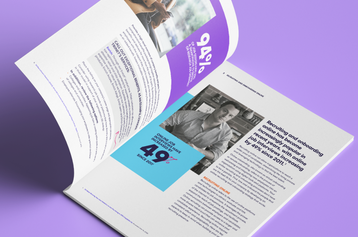Recruitment Process Outsourcing: Should Your Business Consider It?

Table of contents
- 1.Understanding Recruitment Process Outsourcing
- 2.How RPO differs from traditional recruitment
- 3.The key objectives of RPO strategic solutions
- 4.Benefits of Recruitment Process Outsourcing
- 5.Cost-effective and efficiency improvements
- 6.Access to specialized expertise
- 7.Scalability and flexibility
- 8.Better candidate experiences
- 9.Improving time-to-fill metrics
- 10.Cost Models for RPO
- 11.Fixed fee
- 12.Per-hire fee
- 13.Percentage of salary
- 14.Project-based
- 15.Hybrid models
- 16.When to Consider Recruitment Process Outsourcing
- 17.Signs within the organization
- 18.Industry-specific considerations
- 19.Other factors
- 20.Building Your Business by Taking Advantage of RPO
Recruitment process outsourcing (RPO) involves an employer outsourcing its recruitment processes to a third-party provider.
An RPO solution can help improve a company's talent acquisition efforts and fulfill its hiring needs. In this article, we will explore the core principles of RPO, see how it differs from traditional recruitment, and review the benefits of using an RPO provider.
Understanding Recruitment Process Outsourcing
Hiring has become a more in-depth, complex process over the years. The tight labor market has made it increasingly difficult to find and hire the best talent. Candidates "ghost" companies — making appointments for job interviews and failing to show up. Mobile phones are a principal form of communication and major tool for hiring. Advanced recruitment technology helps, but the process can still be time-consuming and costly.
RPO services helps your organization recruit. RPO providers leverage your company's culture, business model, and other specific information to build your talent pipeline.
They can help with the entire recruitment process or perform specific HR responsibilities, such as:
- Analyze your workforce needs
- Conduct workforce planning
- Market your job openings
- Provide screening processes for candidates
- Report on recruiting metrics
How RPO differs from traditional recruitment
An RPO differs from traditional recruitment methods in several ways.
- Outsourcing. While traditional recruitment is handled entirely by an in-house recruiter, RPO involves outsourcing various (or all) aspects, from candidate sourcing to onboarding.
- Cost structure. RPO providers can offer a predictable cost structure, saving businesses from unexpected expenses when hiring demands accelerate. Organizations typically pay only for the services they need, making it a cost-effective choice.
- Time efficiency. Outsourcing recruitment via RPO provider helps accelerate the recruitment process. By using efficient technology like an applicant tracking system and streamlined workflows, they reduce time-to-fill metrics.
- Expertise. RPO provider personnel are proficient at recruiting and hiring, which is an expertise that many small and mid-sized businesses lack.
The key objectives of RPO strategic solutions
The primary objectives of implementing RPO in an organization are:
- Core competency focus. An RPO provider allows companies to concentrate on their core business functions while experts handle the intricacies of talent acquisition. This shift in focus can result in improved overall business performance.
- Broader reach. RPO providers often have a national and/or global presence. This enables organizations to tap into a broader talent pool and expand their operations globally with ease.
- Consistency and standardization. RPO solutions enforce consistent hiring processes and standards across the organization. This consistency helps to ensure an objective recruitment practices.
- Technology advantage. RPO providers have the resources to employ innovative recruitment technologies and analytics tools to help identify the most suitable candidates. Companies benefit from access to these advanced resources without investing in them themselves.
- Improved employer brand. An overwhelmed internal staff sometimes gives a disjointed impression to a job candidate. An RPO provider represents its clients in a professional way. This helps to build a strong employer brand, attract higher-quality candidates and develop a stronger, more productive workforce.
Benefits of Recruitment Process Outsourcing
RPO providers offer many benefits for all sizes of companies, including small and medium-sized organizations.
Cost-effective and efficiency improvements
It can be cost effective because you may not need internal resources or you can allocate internal resources more efficiently and focus on their core operations.
Access to specialized expertise
RPO providers can bring industry-specific expertise, helping SMBs tap into the right talent pools and make informed hiring decisions.
Scalability and flexibility
Companies often experience hiring fluctuations. RPO's scalability and flexibility enable them to expand or contract their recruitment efforts as required. This can help a company not overstaff during quiet periods and understaff during busy times.
Better candidate experiences
SMBs can create a competitive advantage by offering a superior candidate experience. RPO providers prioritize candidate engagement, helping to ensure that potential hires have a positive impression of the company.
Improving time-to-fill metrics
If your business struggles with filling its open roles, productivity can suffer. RPO providers tend to maintain efficient processes that can help get qualified people in your seats faster than other methods. Decreasing time-to-fill reduces the disruptions that turnover has on your business operations.
Cost Models for RPO
To make a good decision, businesses must understand the pricing models for RPO providers. The choice of model can significantly impact hiring costs and the benefits of outsourcing recruitment.
Fixed fee
The RPO provider can charge a fixed fee for their services. It doesn't matter how many hires your company needs. If your organization has consistent hiring needs, this pricing plan could work well.
Per-hire fee
If your business has sporadic hiring requirements, you may want a pricing structure where you pay on a per-hire basis.
Percentage of salary
In this model, the RPO provider cost is based on a percentage of the hired candidate's annual salary. RPO providers make more money on placing higher-level (higher paid) managers and executives.
Project-based
For specific recruitment projects, businesses can opt for project-based pricing, paying a predetermined fee for the completion of the project.
Hybrid models
Hybrid models combine elements of different pricing structures to tailor the RPO arrangement to the specific needs of the business.
When to Consider Recruitment Process Outsourcing
Deciding if and when it's time to engage with an RPO provider, you'll need to consider signs within your organization and external market intelligence.
Signs within the organization
- High turnover. If your organization is struggling with high turnover rates, RPO provider may be able to help improve retention by recruiting hires that align with your business culture and goals.
- Inefficient hiring process. Lengthy and cumbersome hiring processes can deter top talent and hurt productivity. RPO providers can help streamline the process and improve efficiency.
- Inconsistent results. If your recruitment outcomes are inconsistent or frequently result in misfits, RPO providers may offer strategic guidance that can lead to better hires.
- Resource constraints. When resources are limited, outsourcing recruitment can be a cost-effective solution.
Industry-specific considerations
- Your company hires seasonally. Industries with seasonal fluctuations in hiring needs can benefit from RPO provider's scalability.
- You're seeing skill shortages. If your industry faces skill shortages or highly competitive talent markets, RPO providers can give you a competitive edge by helping you reach qualified candidates.
- You're eyeing global expansion. RPO providers with international reach are valuable when expanding into new markets.
Other factors
- Business growth. RPO providers can help fast-growing businesses struggling to meet their hiring demands.
- Cost control. For businesses looking to control costs and allocate resources efficiently, an RPO provider can offer a cost-effective solution.
- Compliance requirements. Some industries are regulated more than others. RPO providers skilled in specific industries can help your business with compliance.
Building Your Business by Taking Advantage of RPO
Recruitment process outsourcing can help your organization such as helping with the recruitment process, creating consistent hiring practices, and elevating the quality of your new employees.
When companies put their hiring strategies in the hands of TriNet, they acquire the tools and expertise needed to help them recruit and hire top talent. With cutting-edge technology, our applicant tracking helps to organize candidates’ information and streamline your recruiting process. TriNet can also help you attract your best talent through access to premium benefits. Contact us now to learn more about how TriNet can help with your recruitment process.
This communication is for informational purposes only, is not legal, tax or accounting advice, and is not an offer to sell, buy or procure insurance.
This article may contain hyperlinks to websites operated by parties other than TriNet. Such hyperlinks are provided for reference only. TriNet does not control such web sites and is not responsible for their content. Inclusion of such hyperlinks on TriNet.com does not necessarily imply any endorsement of the material on such websites or association with their operators.

TriNet Team
Table of contents
- 1.Understanding Recruitment Process Outsourcing
- 2.How RPO differs from traditional recruitment
- 3.The key objectives of RPO strategic solutions
- 4.Benefits of Recruitment Process Outsourcing
- 5.Cost-effective and efficiency improvements
- 6.Access to specialized expertise
- 7.Scalability and flexibility
- 8.Better candidate experiences
- 9.Improving time-to-fill metrics
- 10.Cost Models for RPO
- 11.Fixed fee
- 12.Per-hire fee
- 13.Percentage of salary
- 14.Project-based
- 15.Hybrid models
- 16.When to Consider Recruitment Process Outsourcing
- 17.Signs within the organization
- 18.Industry-specific considerations
- 19.Other factors
- 20.Building Your Business by Taking Advantage of RPO





